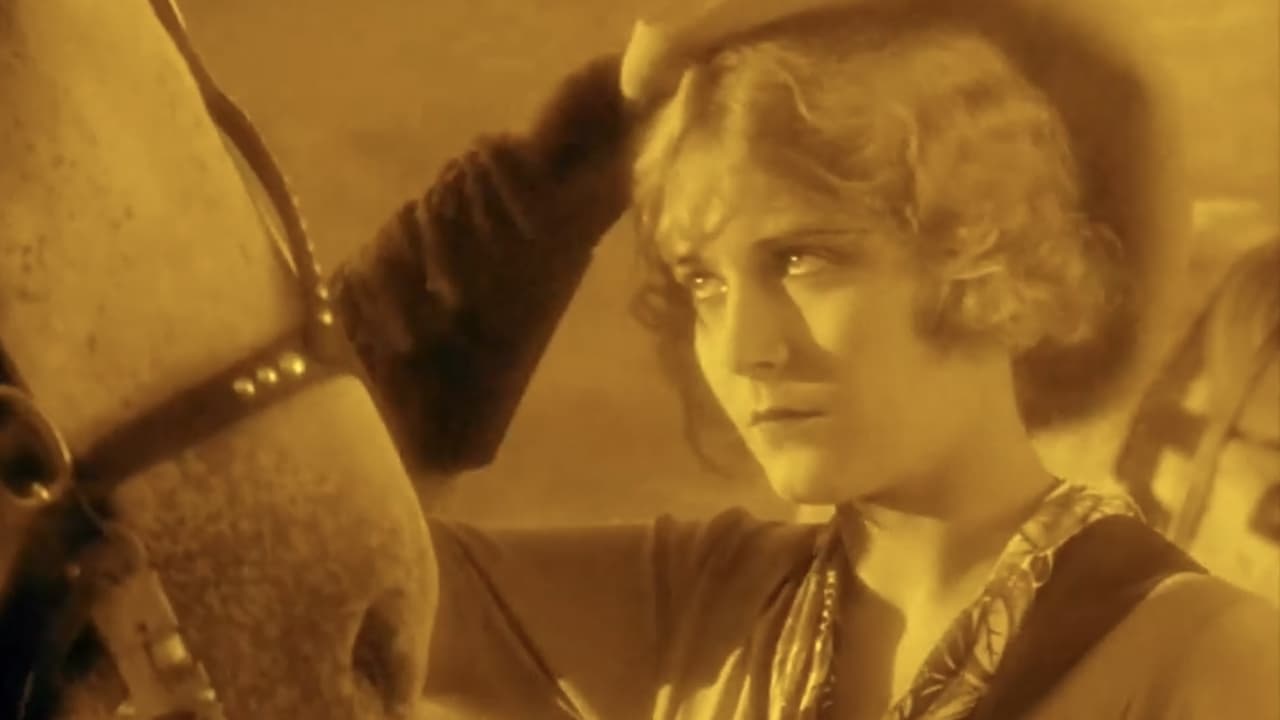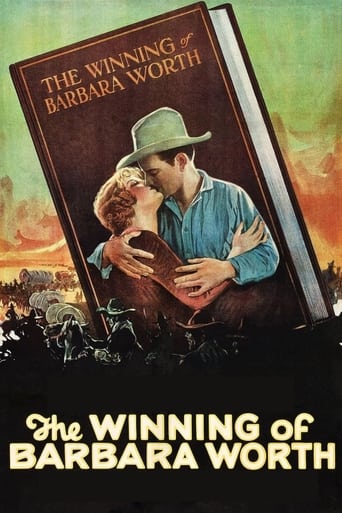


Excellent, smart action film.
... View MoreI think this is a new genre that they're all sort of working their way through it and haven't got all the kinks worked out yet but it's a genre that works for me.
... View MoreA film of deceptively outspoken contemporary relevance, this is cinema at its most alert, alarming and alive.
... View MoreThere's no way I can possibly love it entirely but I just think its ridiculously bad, but enjoyable at the same time.
... View MoreSYNOPSIS: Jefferson Worth's dream is to turn the desert wasteland into a garden paradise. To bring this worthy project to fruition, he turns to the Wall Street financier, James Greenfield, and his step-son, engineer Willard Holmes. Unfortunately, Greenfield is a crook.NOTES: Although he figures way down the cast list, Gary Cooper (in his first credited movie appearance) is in reality playing the second male lead. (In fact, he has actually been bumped up into third position on the current DVD). This role was originally slated for cowboy star, Harold Goodwin. Unfortunately for his own career, Goodwin was delayed at Warner Brothers where he was making The Better 'Ole with Syd Chaplin. A replacement had to be found in a hurry. Henry King remembered a screen test he'd seen of Gary Cooper whom he'd signed on as an extra at $50 a week. So King offered Cooper the role and an additional $15 a week.COMMENT: Although it only intermittently captures the religious flavor and fervor of Harold Bell Wright's 1911 novel, The Winning of Barbara Worth proves a grand movie experience, with winning performances all around in a fast-moving plot that cascades into an unforgettable climax. The photography is outstanding and King's direction both forceful and fluid. Production values are particularly rich with awesome location footage and thrilling action scenes involving hundreds of extras. Even Clyde Cook's comic relief seemed mildly amusing. And as for the clash of leading men, personally, I thought the charismatic Cooper easily outshone hard-working Colman. (DVD from M-G-M. Quality rating: 10 out of 10).
... View MorePrevious reviewers have covered the plot of this film, so i will limit myself to saying that it left me a little disappointed. I did not find the effects particularly impressive, especially when compared to "Noah's Ark". What I liked better were the scenes when the towns men are preparing to go on the rampage if their pay doesn't arrive; Barbara is particularly vulnerable when one of the bad guys takes a shine to her, however, all turns out well in the end. Having read oldblackandwhite's comments about how close we can get to experiencing these movies as a silent era audience would, I suspect that this will never be truly possible, as modern audiences simply don't have the life experiences of our predecessors. I find that when I have been to presentations of silents, the audience, by and large have gone to gawp at an old curiosity, rather than to enjoy a work of art. I pity the fools!!
... View MoreGary Cooper was one of the most consistently popular stars of classic cinema from the beginning of the talkie era to his death in 1961. However there is a lesser-known early chapter to his career, when he played supporting roles in a series of silent pictures. He never achieved stardom in this period, in part because a lot of his appeal was founded in his warm, steady voice. Still, his charming persona was enough to shine through even in these non-speaking days, as this, his first credited appearance, shows.The Winning of Barbara Worth was a prestigious picture in its day, directed by the respected and capable Henry King. King was really good at these human dramas played out against a grand backdrop. On the one hand he keeps the vastness and deadly potential of the desert a continual presence, with landscape shots that seem to go on forever. But on the other hand he is not averse to stripping away all other business to just focus us on people and their faces. There are some really neat close-ups here, such as Gary Cooper jealously spying on Vilma Banky with Ronald Colman, or Banky as she walks out on Colman. These shots aren't overused, and they seem to segue naturally into the editing pattern rather than being "look-at-this" attention-grabbers. But what is really impressive is the way King can arrange things to tell the big story and the intimate one simultaneously. Look at the scene in which the water flows into the irrigation system. The crowd cheer and dance ecstatically, but the main characters who have put more into this than any other are stood still, as if overcome with emotion. There are a handful of close-ups of various reactions, and then we see Banky and Colman share their first kiss, and all the liveliness behind them reflects the intensity of the moment. As the kiss breaks off there is a sudden feeling of awkwardness between them, and the slowing of the crowd seems to mimic this too.And this is very much a *silent* drama of reactions, expressions, motions and body language. Gary Cooper may not have his voice here but he does have that deep, sensitive face and steady, deliberate way of moving. His acting is only passable at this stage, but he has the look of a man one can implicitly trust, and this goes a long way in screen stardom. And yet for this picture Cooper is ostensibly the third wheel, behind dapper, moustachioed lead man Ronald Colman. Colman was a very decent dramatic player, and as with Cooper there was something innately likable about his manner which secured his success into the sound era. Colman is very good here, and it is only his experience as an actor coupled with his own honesty and simplicity that prevent him being outshone by Cooper. The leading lady is Vilma Banky, who shot to fame as the object of ravishment for Rudolph Valentino. In this slightly more grown-up picture she reveals herself to be a very fine actress, and like her two male co-stars she has a capacity for deeply expressive reacting. Sadly her career was to fizzle out in the sound era, probably because English was not her first language.Story-wise, The Winning of Barbara Worth is a tale of progress and prosperity that is very typical of Roaring Twenties optimism. And perhaps herein lies another reason why Cooper didn't become a cinematic icon until a few years later. The end of the silent era happened to coincide with the beginning of the great depression. Before that, Cooper's down-to-earth nature didn't really fit with the grandiose flights of fancy that made up most of 1920s cinema. However by the 1930s, cinema had suddenly become very different in its scope and focus. Heroes became ordinary men who worked for a living, and the heroin really would marry the boy next door. As it is, this picture sees Cooper as the homely type whom Banky loves as a brother. There's no real problem with this – Cooper isn't miscast, he's simply in the wrong time for lead roles – and he plays his part aptly in what is a very worthy 20s drama.
... View MoreDuring the silent screen years Ronald Colman and Vilma Banky were a popular screen team and The Winning Of Barbara Worth was their first film together. Neither Colman or Banky was particularly happy with doing a western and certainly neither are players you would think of for a western. But in the days of the silent screen you could not hear Colman's cultured English tones or Banky's thick Hungarian accent which killed her career in sound films.The Winning Of Barbara Worth is a modern western set in 1926 Arizona where Banky's father is the local head honcho in a small town. Father Charles Lane has a dream of building a dam and irrigating the desert and turning it into an agricultural paradise. But he puts his trust and the hard earned cash of his people into the hands of the unscrupulous E.J. Ratcliffe who cut many corners and built one inferior dam. His chief engineer Ronald Colman points that out to him and his fired for his trouble.Undaunted, Colman gets new backing from millionaire Fred Esmelton and goes to work on a new dam. Which does not fit in Ratcliffe's plans and he tries to stop Colman by fair means or foul. Colman also has eyes for Banky, but she's already got Gary Cooper courting her. And Coop's the jealous type and does not think Colman is on the up and up.Henry King whose career in films spanned over 40 years and was the top contract director at 20th Century Fox during sound did a great job both with his live players and the cinematography. The overflowing dam and subsequent flood was of DeMille like quality.Maybe Ronald Colman and Vilma Banky aren't what many would consider western names, but that sure can't be said about Gary Cooper for whom this was his first featured role. Coop had done many bit roles in silents up to this time, but he was a complete unknown at this time and The Winning Of Barbara Worth was his first part with billing. You probably could not have made this film during sound with the voices of Colman and Banky, but when Cooper uttered his first screen words in Wolf Song, this man's voice perfectly suited the characters he had been playing on the screen already. In fact both Colman and Cooper went on to far bigger careers because of sound unlike poor Vilma Banky who barely spoke any English.In the scenes he's in Gary Cooper steals the film and there was no doubt this man was going to be a major star. The Winning Of Barbara Worth holds up very well as drama and with Gary Cooper a star was born.
... View More